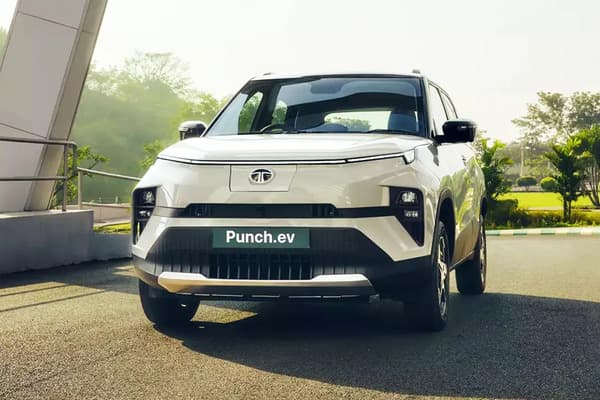Tata Punch EV
Tata Punch EV is a 5 Seater seater car, Ex-showroom price starting from Rs. 10,99,000 in India. It is available in 20 variants, and 1 transmission option: Automatic .| Battery Capacity | 25-35 Kwh |
| Max Speed | 85 Kmph |
| Range | 315-421 km |
| Charging Time | 3.6 - 5 Hrs |
About Tata Punch EV
Tata Punch EV price starts at ₹ 10.99 Lakhs and goes up to ₹ 15.49 Lakhs (Ex-showroom). Tata Punch EV comes in 20 variants. Tata Punch EV's top variant is Empowered Plus S long Range 7.2 Fast Charger.
₹10.99 Lakhs* | 25 KWh 315 Km |
₹11.49 Lakhs* | 25 KWh 315 Km |
₹11.99 Lakhs* | 25 KWh 315 Km |
₹12.49 Lakhs* | 25 KWh 315 Km |
₹12.79 Lakhs* | 25 KWh 315 Km |
₹12.99 Lakhs* | 35 KWh 421 Km |
₹13.29 Lakhs* | 25 KWh 315 Km |
₹13.29 Lakhs* | 25 KWh 315 Km |
₹13.49 Lakhs* | 35 KWh 421 Km |
₹13.49 Lakhs* | 35 KWh 421 Km |
₹13.79 Lakhs* | 35 KWh 315 Km |
₹13.99 Lakhs* | 35 KWh 421 Km |
₹13.99 Lakhs* | 35 KWh 421 Km |
₹14.49 Lakhs* | 35 KWh 421 Km |
₹14.49 Lakhs* | 35 KWh 421 Km |
₹14.49 Lakhs* | 35 KWh 421 Km |
₹14.99 Lakhs* | 35 KWh 421 Km |
₹14.99 Lakhs* | 35 KWh 421 Km |
₹14.99 Lakhs* | 35 KWh 421 Km |
₹15.49 Lakhs* | 35 KWh 421 Km |
Tata Punch EV Specifications and Features
| Body Type | Compact SUV |
| Battery Capacity | 25-35 Kwh |
| Airbags | Yes |
| Range | 315-421 km |
| Charging Time | 3.6 - 5 Hrs |
My Garage
Popular Tata Cars
- Popular
- Upcoming
| 1 & above | |
| 2 & above | |
| 3 & above | |
| 4 & above | |
| 5 rating |
Tata Motors has a lion's share in the still fledgling electric car segment in India and has built its ambitions on the shoulders of the very popular Nexon EV (electric vehicle). The current lineup now also includes the relatively affordable Tiago EV hatchback and the Tigor EV sedan for added options for the early adopters. But while the company may have played a rather safe game with all of these EVs, its next offering is also its biggest bet yet. Say hello to the Tata Punch EV.
Here is the first-drive review of Tata Punch EV:
Tata Punch EV: Exteriors
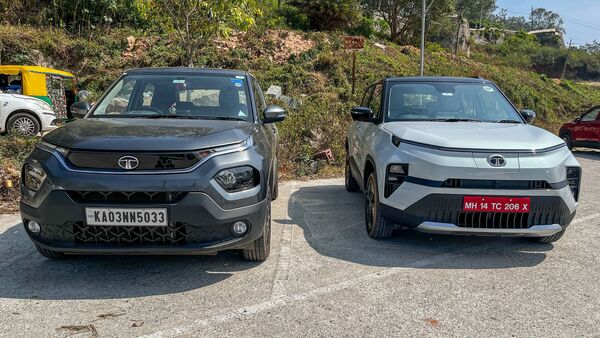
It won't be too far-fetched to describe the Punch EV as a facelift version of Punch ICE. This is because the overwhelming bulk of the styling updates to the electric twin is reserved on the face of the model. Whether it is the stretched DRL light signature that is now finding its way to more and more Tata vehicles, or the completely reworked projector head light units, complete with sequential turn indicators, the fog light housing, or the entirely different front bumper with skid plates, the Punch EV benefits enormously from a very smart, handsome and contemporary face. It is now also the first EV from the Tata Motors stable to get its charging slot at the front instead of on the side. Press of a button on the centre panel in the cabin and the flap opens up. Unfortunately though, there is no button to shut it back and one would have to do it manually.
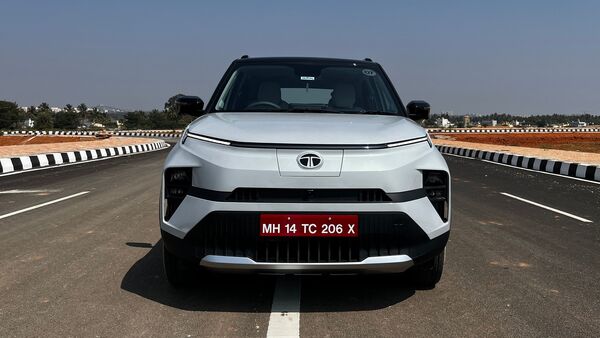
Over at the side, the Punch EV is nearly similar to the Punch we have become accustomed to over the years, barring the change to the alloy design on the 16-inch wheels. There is a small ‘.EV’ lettering in Blue to signal the zero-emission credentials. Glide to the back and th changes are even less significant here. The tail light design is the same, the contours of the trunk door are also carried forward and barring the 'Punch.ev' lettering and skid plates on the rear bumper, it would be hard to distinguish it from the ‘conventional’ Punch.
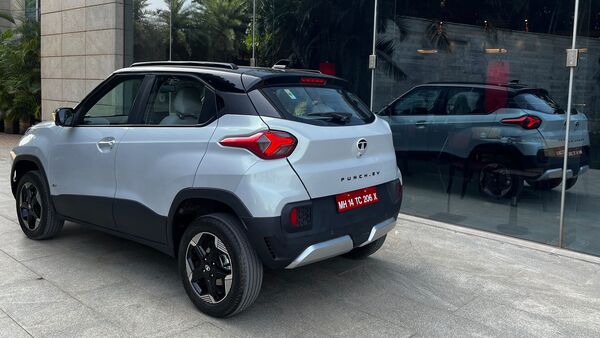
The EV is available in a total of nine body colour options. This includes four single-tone shades - Seaweed (a deep shade of Green), Fearless Red, Daytona Grey and Pristine White. There are five dual-tone options too with all of the previously-mentioned colours coming with Black roof and an additional Empowered Oxide (deep sand-like hue) shade with Black roof.
Now while the face of the Punch EV is surely several steps forward, the overall styling on the body could have been more different than at present to regally announce that this is indeed an EV. But much like on all other EV models from Tata Motors, the core styling elements have been carried forward. Thankfully for the Punch, its styling has always been on point.
Tata Punch EV: Interiors
The cabin of the Punch EV is where Tata has done bulk of the work, ensuring that this here is several steps ahead of not just its ICE counterpart but from interiors of even the Tiago EV and Tigor EV. And why not because the Punch EV is positioned above both of these electric models.
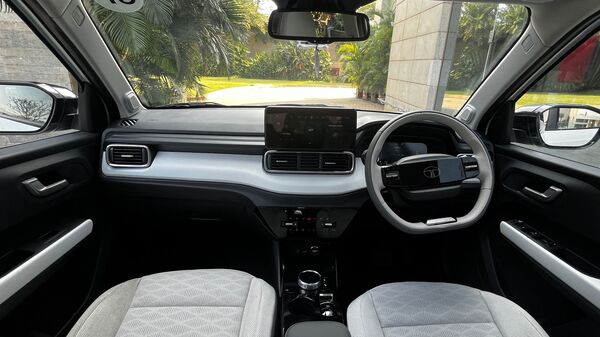
There are two key aspects to the cabin of the Punch EV - the feel and features. In case of the former, the Punch EV gets semi-leatherette seats and has a light-coloured thematic play. Complete with the sunroof on top and the sufficiently large windows, the cabin does feel airy even if the rear-seat space is still every bit as compromised as before. Nothing has changed in terms of exterior dimensions and so, this was already assumed. And then there is the feature list.
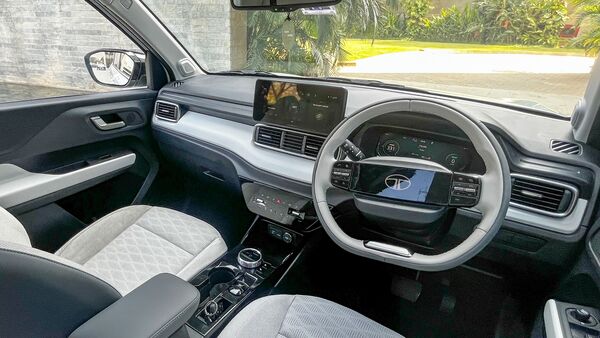
Unfortunately, the rear-seat passengers are not even compensated for a general lack of space with comfort features - no rear AC vents, no charging points and no cup holders either on the armrest in the middle. But on the flipside, the driver and front passenger is pampered like newly weds. A new 10.25-inch free-standing main screen takes a place of prominence on the dashboard and has a crisp display feed while also being intuitive to use. A slew of apps, including streaming platforms like Netflix and Disney Hotstar, are available for download. And in terms of practicality, the feed from the surround-view cameras are great as well. Then there is a 10.25-inch all-digital driver display screen as well and one key highlight here is that Google Maps can be transferred from the main display to here.
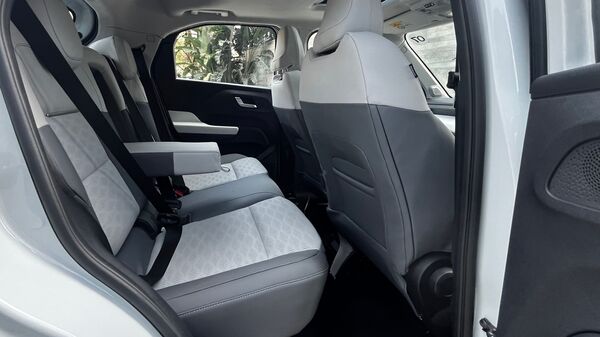
The center console is well appointed with a phygital set up for controlling air conditioning. Just two physical buttons to control the airflow speed and temperature while rest falling on touch buttons is a great way forward. Then there is the familiar drive dial in its jewelled circular shape, two buttons for drive modes, plenty of cupholders and an array of options for charging your phone through cables. And just in case your phone supports the function, there is wireless charging as well although using to to power our iPhone 13 was terribly slow.
The other feature highlights include voice-enabled commands for Alexa, Google, Siri and Tata, ventilated front seats, support from Tata's Z-Connect mobile application, air-purification system and a decent sound set-up.
Boot space remains at around 366 litres which is adequate for small families but the Punch EV also offers a small storage space under the bonnet. The Frunk (front trunk) can hold items up to five kilos and while it does feel a bit flimsy, is a nifty addition nonetheless. Tata has also played it smart by offering no spare wheel and instead, putting a puncture-repair kit at the back.
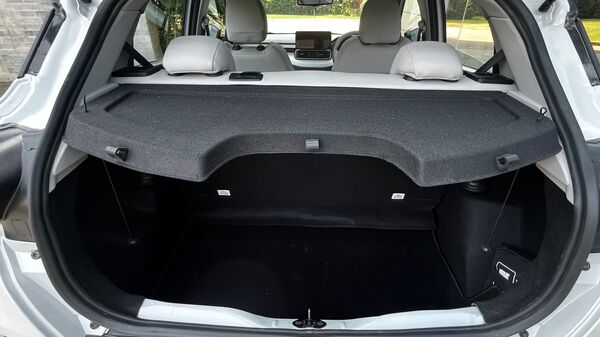
Overall, the cabin is quite premium for a car in this segment and the feature list is mighty impressive too even if many of these are limited to upper variants. Space at the back is the only big concern here.
Tata Punch EV: Drive
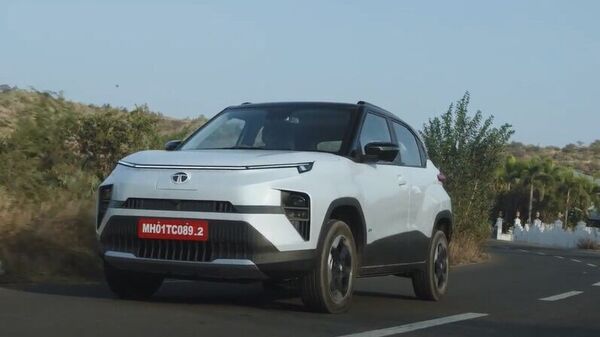
Here is where things get a bit complicated. Not to worry because we explain. The Punch EV comes in five broad variants and two versions. There is a standard range version with a smaller 25 kWh battery pack that promises a range of around 315 kms. It offers 82hp and 114 Nm of torque and can be charged using a 3.3kW wall box charger.
For those who may not be on an absolutely tight budget, there is also the Punch EV long-range version which gets a 35kWh battery for a claimed range of around 420 kms. It also promises better performance - 122hp and 190Nm, and can be had with a 7.2kW fast charger. The catch? This fast charger will cost an additional ₹50,000.
The lowest two variants - Smart and Smart+, do not offer the bigger battery which is instead, reserved for Adventure, Empowered and Empowered+ variants. The smaller battery pack version is available across all five variants.
During the course of this test run with the Punch EV, we got the top Empowered+ with the larger battery pack. At the very beginning of our drive, we had 98 per cent charge on the unit and a displayed range of 348 kms. Now the EV as usual starts in the normal drive mode - City, to be specific - by default and instantly feels a bit heavier to drive than its siblings. There is a clear heft to the steering and the accelerator pedal needs to be pressed harder to get a move on. This feels reassuring at high speeds of over 80 kmph where the Punch EV ambles along really well. But within city limits, this will take a certain degree of getting used to. In the Eco drive mode, the effort needed is a bit more still but switch to Sport mode and the Punch EV comes into its liveliest best.
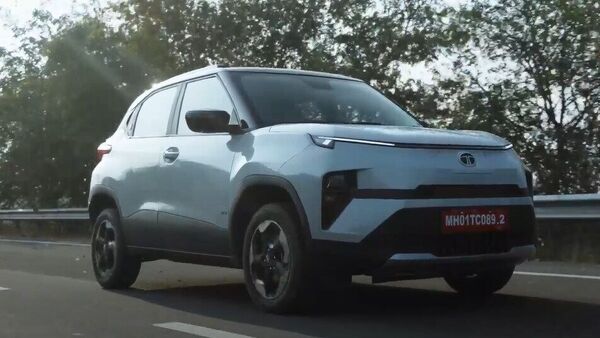
Of course, there are paddle shifters on both sides of the steering to control the level of regenerative braking. Keep it on two and the drive mode in City to find the best balance between performance and range.
The Punch EV also has some seriously fantastic off-road capabilities considering it is not a car that is meant to be doing much rumble. A ground clearance of 190 mm and a decent water-wading capability means that the car ought to be absolutely fine over menacing speed breakers and intimidating roads that are submerged under monsoon fury.

Tata Punch EV: Verdict
Punch EV is the most well-balanced electric car from Tata Motors yet. And that's primarily because of factors such as its styling, range, features and price point. It doesn't exactly have a direct rival in the market as of now but it will surely has potential to take many customers away from Nexon EV. For Tata though, it should be all okay as long as all is within the family.
The launch of the Punch EV has come at just the right time because just because there is no direct rival yet does not mean the field of play won't get crowded soon. Rivals would be putting this model under the microscope to devise their own strategies and frankly, so should you if you have been thinking of driving home an electric car.




